"Do you think a human being will ever beat a person at chess?" |
"Oh, between a human being and a person? My money's on the computer." |
Computer geeks tend to come in two distinct flavours when it comes to how they are usually presented in films. They're either rock 'n' roll whiz kids like Keanu Reeves in The Matrix, who know how to look good even as they are bypassing supposedly impenetrable security systems, or hyper-smart über-geeks with poor social skills but the ability to crack even the toughest code without breaking a sweat, as epitomised by the loveable D.J. Qualls in The Core. It's rare to find a computer nerd in a film who isn't a hacker, rarer still to find one who's older than thirty. In the eyes of Hollywood, middle-aged men who write corporate software or smartphone apps aren't likely to set the box-office alight.
And what of chess players? In films being good at chess is a favourite shortcut to character sophistication and supposedly superior intelligence. If you want to show that a character is smart, have him play chess against someone and win in ten moves. If he can do that then we as an audience know that when he suggests that he needs a toothbrush, a piece of copper wire and a small jar of uranium 235 to effect the hero's escape, you'd better listen to the man.
Of course a number of real world computer nerds are now household names whose hardware and software we use on a daily basis. And hard though it may be for some younger readers to believe (I'm having trouble as I write this, and I was there when it happened), but there was a time when the names of the world's leading chess players were as well known of those of top athletes and pop stars. Ask almost anyone of my generation about the likes of Bobby Fischer or Anatoly Karpov and they'll know who you mean whether they play chess or not.
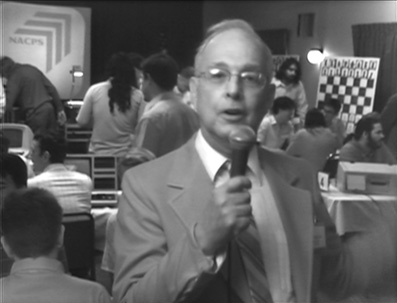
Back before computers were able to draw pictures in colour, computer scientists were fascinated by the concept of artificial intelligence and creating a computer that could emulate the human brain. It's a quest whose ultimate goal was defined by a test proposed in 1950 by British mathematician and computer scientist Alan Turing; to create and program a computer that could exhibit intelligent behaviour indistinguishable from that of a human being, the litmus test being that a person could converse with the computer without ever realising it was a computer. One of the first rungs on this monumentally high ladder was to create a program that could not just play chess with a human opponent, but beat even the most skilled of grand masters. And in 1990 this once daunting task was accomplished when Gary Kasparov, the man many regard as the greatest of all chess champions, was challenged and beaten by an IBM computer named Deep Blue.
The dual noun titled Computer Chess, the latest film from Funny Ha Ha director and mumblecore leading light Andrew Bujalski, is set at a weekend conference taking place somewhere in the late 1970s, one at which university computer programming teams meet to test their systems and programming skills against each other and learn from their successes and their mistakes. There no one overriding narrative here, more a series of encounters peppered by individual triumphs and failures, many (though not all) of which are computer related. Specific individuals shift in and out of focus as the story unfolds without ever becoming fully fledged lead characters. The closest the film gets is young, shy and socially insecure Peter Bishton, whose dogged determination to uncover the reason why his team's computer makes suicidally poor moves leaves him blind to the interest shown in him by Shelly, a member of a rival team and a rare female programmer, who helps him to formulate a seemingly unlikely theory. Later he is invited to the room of a couple attending some sort of new age sexual awakening seminar being held simultaneously at the same hotel, and ends up running for his virginity when the pair's friendliness grows into suggestions for a threesome. Almost as intriguing as Peter, though considerably less sympathetic, is the pushy and self-centred Mike Papageorge, who arrives at the conference without a hotel booking, and after failing to convince others to let him sleep in their room, ends up wandering the building at night like the ghost of a long dead caretaker. Oh yes, and the whole thing is shot in monochrome on 1980s analogue video cameras in the old 4:3 aspect ratio, complete with the visual glitches that sometimes result.
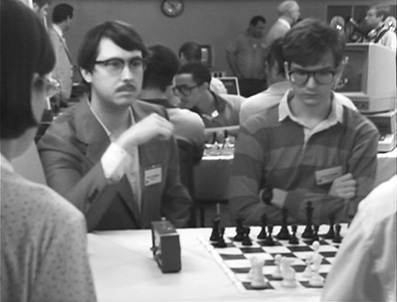
What may sound like a recipe for a mind-numbingly dull ninety minutes of screen time proves a strangely captivating and rewarding film experience from a surprisingly early stage. That it's been championed as such by younger (re-) viewers than myself is actually rather comforting, as initially I was concerned that my own engagement was driven by nostalgia for a time when computers had keyboards that clunked noisily as you typed and could only be operated by punching in lines of code, and when video cameras could not be pointed at the sun or its reflection for fear of burning out the tube. These are the very video cameras that I first trained on, ones light enough to carry but which had to be hooked up to a reel-to-reel video tape deck heavy enough to induce a hernia if used for extended periods.
But there's also an immediate intimacy with the characters created by the authentically documentary feel and the naturalistic performances and dialogue, which work with the low-band video aesthetic to give the film the look of a 1970s Open University broadcast. So convincing is this at times that you almost forget that you're watching a drama, and have to remind yourself that one contestant's claim that computers will one day be used for dating is a line of dialogue pre-prepared with hindsight and not the uncanny future prediction it appears to be. And there's a Brotherhood of Geekdom element here that should trigger an instant empathic response in anyone whose passion for anything – cinema included – can only be really shared with like-minded souls.* The programmers' collective obsession may have seen them sidelined from regular society, but in each other's company they are, for the most part, as communicative and socially adept as any of us.
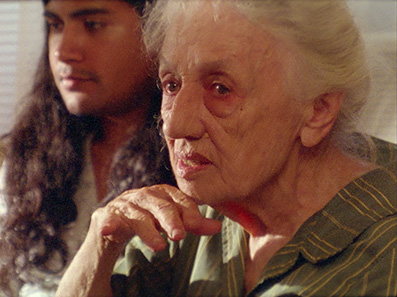
This delicate balance between realism and drama Bujalski then enriches with small but potentially risky surrealistic touches. Some are dryly comical – the cat that appears able to ride the elevators by night – while others are down to technical issues with the analogue video that may or may not have been deliberately manufactured, as with the lower third picture glitch in a late bar scene that causes Professor Schoesser's legs to extend in small jumps, while the clock on the wall behind him appears to change shape. There's also brief but somewhat jarring style switch mid-way through from monochrome analogue video to 16mm colour film when Papageorge nips off to his mother's house and gets stuck in a real world stalemate loop. There's even an intriguing science fiction thread in the suggestion that the Caltech team's computer has become self-aware, something first subtly implied by the HAL 9000-style computer POV shot of the programmers, and seemingly confirmed by Peter's conviction that the machine is deliberately losing games because it prefers to play against human opponents.
And it all works sublimely. Bujalski delivers a convincingly authentic insight into this little-understood micro-community and makes us feel part of it, which in turn makes it oddly easy to sympathise with characters that we actually never get to know all that well. This is particularly true of Peter, whose shy late adolescent awkwardness will for many have an all-too familiar ring, and whose final encounter – be it geek daydream, future prophecy or a more literal rendering of the film's underlying fascination with the fluidity of time – genuinely made me jump out of my seat on my first unprepared viewing. It's thus a tad paradoxical that what is without question the geekiest film of the year also happens to be one of the coolest.
Now here's an interesting one. Given that the film was shot on analogue monochrome video cameras from the 1970s, it's hard to talk about the HD transfer in the usual terms. The contrast varies depending on the light levels, displaying some aggressive blacks and burned-out whites on exterior shots but being considerably softer on some of interior footage, but for much of the time the balance is rather good. That the image is a little soft is par for the old analogue video course, but it always looks right, and the HD mastering does ensure that no new artefacts or digital issues have been added to the transfer. Allowing for the self-imposed restrictions of the analogue video, frankly it looks great, and there's a shot of Papageorge's mother in the 16mm colour sequence that's almost sharp enough to cut your finger on.
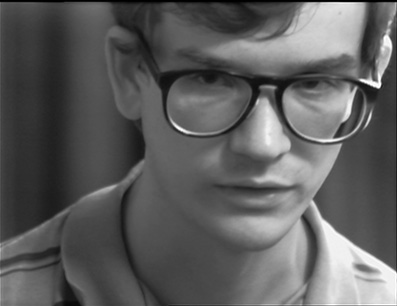
The Linear PCM stereo 2.0 soundtrack, which was doubtless recorded digitally, has been very subtly processed to have a trace of old school dynamic range restriction whilst remaining clear at all times, thereby not shattering the illusion so carefully crafted by the visuals. The music always sounds good.
Commentary by Deep Blue programmer Murray Campbell
This may not sound like a great idea, but as with the subject matter for the film itself, it's dangerous to pre-judge based on supposition alone. One of the men behind the computer chess program that finally beat a grand master, Campbell recalls attending many conventions of the sort depicted in the film and testifies to the authenticity of their recreation here, right down to the conversations that take place between programmers, though does question the likelihood of one exchange and states simply, "I don't buy this." He provides a fascinating insight into the development and evolution of chess-playing software, dismisses the idea that it could ever have any practical military applications, and talks about how developments in the field of artificial intelligence have made their way into video games. He also informs us that "Computers now know how to perform at an incredibly high level but can't explain it to us poor humans in terms we can understand." A consistently and unexpectedly enthralling track.
Commentary by an Enthusiastic Stoner
Oohh-kay. Novelty or comedy commentary tracks never really work for me, being usually based around a single gag that wears out its welcome in a matter of minutes. Witness Bruce Campbell's commentary as Elvis on the US DVD of Bubba Ho-Tep – it sounds like a funny concept and for a short while it does amuse, but you soon find yourself reaching for the fast-forward button. Such is also the case here. Ostensibly the voice of Ken Osborne of the snappily titled Ken Osborne Corporation, the suspicion is that this actually the work of Andrew Bujalski or one of his mates, though I'm happy to be officially corrected on that. The track involves Ken sitting down to watch the film for the first time and commenting on what he sees, which consists largely of him describing what is happening on screen and pointing out the obvious, pausing every now and again to grab a drink, eat some food or take a hit on a bong. It's a bit like trying to watch the film with someone who insists on constantly verbalising their thoughts instead of just shutting up and watching the film. He does point out a couple of things that I'm guessing Bujalski might be worried you missed, but this does tend to overstate what works so much better when you spot it or work it out for yourself. He concludes by telling us that he's learned that he shouldn't watch a movie and try to talk about it at the same time. That gets my vote.
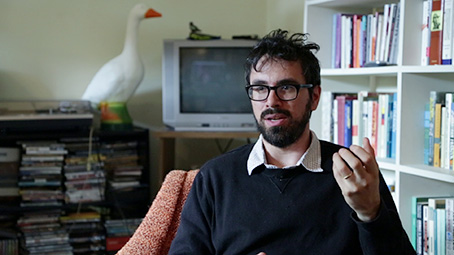
Interview with Andrew Bujalski (28:27)
Affable writer-director Bujalski talks in engagingly open style about the origins of the project ("What's something the marketplace is not asking for at all?"), plus working with a treatment rather than a script, meeting and casting Kevin Bewersdorf, Gerald Peary and Wiley Wiggins, the reasoning behind casting professional actors alongside non-professionals, his admiration for the films of John Cassavetes, why the crew on this film was his biggest yet, and quite a bit more. He also goes into some detail about the technical challenges he and his crew faced shooting on the Sony AVC-3260 camera. A really interesting piece that also looks great (I'm guessing this was shot on a DSLR), but it would have been useful to mic up interviewer Craig Keller as well.
Interview with Wiley Wiggins (21:31)
Another really interesting Craig Keller-conducted interview, this time with actor Wiley Wiggins (who still has a day job as a programmer and user interface designer), who reveals how he met and first worked with Richard Linklater and Andrew Bujalski and talks about his contribution to Computer Chess, which extends beyond his performance as programmer Martin Beuscher to include procuring and programming code into the older computers required for the shoot. A computer enthusiast with a self-confessed obsession with artificial intelligence, about which he talks in compelling detail, he also reveals that some of the computer displays were added in post-production to machines that would no longer boot up, and that the analogue video imagery made motion tracking and image matching a nightmare. Once again, Mr. Keller could have done with his own mic.
Interview with Alex Lipschultz (21:15)
Jon Robertson interviews producer Alex Lipschultz in monochrome HD, and once again this is pure gold for anyone interested in the film's production. Lipschultz talks about the genesis of the project, scouting for the right hotel to use as the main location (they ended up using several) and their approach to period production design. The casting process is covered in some detail (which included phoning friends and asking "Who are the nerdiest people you know?"), as are the mountain of technical challenges created by the decision to shoot on an obsolete video system – seriously, listen to this and realise how easy you have it if you're working with bog standard HD.
Under the heading Promotional Material are five short featurettes and one longer piece.
Kickstarter Video (3:10) is exactly what it claims to be, a video made to promote the film's Kickstarter campaign in which Andrew Bujalski tries to sell the concept of the film to a fake Hollywood executive, who quickly loses interest when he hears Bujalski's answer to the question, "Who's in it?".
Hot Old Personal Computer #1-6 (5:26) is essentially six short promos for the film, all made by Bujalski, each featuring a single drifting shot of a computer from the period in which the film is set, followed by a simple checkerboard graphic and title, all accompanied by synthesised music.
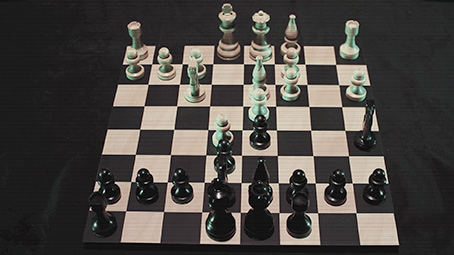
Reference Chess Games #1-8 (45:25)
A Bujalski-directed potted history of the development of computer chess, broken down into key games, which are presented in their entirety using the a single computer chess program that has been visually degraded by adding video scan lines. Each begins with a voice-over contextualising the game in question and outlining how it played out and is scored by peg-board synthesiser music. You'll need to have a keen interest in chess to watch the whole of this one in a single sitting, but if you do then the games and the background detail are likely to be of real interest. Unsurprisingly, perhaps, the piece climaxes with the match in which Deep Blue beat Gary Kasparov.
How to Operate a Sony AVC-3260 (4:42)
A trip down memory lane for me, as cinematographer Matthias Grunsky provides a tour of the video camera on which the film was shot, which as close to dammit as the model that Camus and I would have worked with at film school.
Sundance Promo (2:37)
Shot on the Sony AVC-3260, Andrew Bujalski is questioned about the film by what sounds like a humourless Cylon interrogator.
London Film Festival Introduction (1:37)
A self-filmed intro to the film by Bujalski for the film's LFF screening, which he was unable to attend.
There are two seductively assembled Trailers (1:58 and 2:21), the second of which nicely describes the film as 'an artificially intelligent comedy', and a slightly odder but amusing Outtake Trailer (1:47), which as the title suggests is comprised of footage not used in the final cut.
Analogue Goose (1:35)
Bujalski's response to a request from the New York Times to create a video for their website to show who he is as a filmmaker in one minute. You might be surprised by the result.
Booklet
The prime inclusion here is an essay by Masters of Cinema's own Craig Keller, which examines the film in the sort of detail and with the sort of focus on its sub-structural layering that makes my own reading feel woefully anaemic. It's still a fascinating read, and is accompanied by a note on the specially commissioned cover art by Cliff Spohn, credits for the film, stills (most of which are in colour and include some welcome behind-the-scenes shots) and the usual notes on viewing.
It's hard not to be seduced by Computer Chess, whose winning naturalism has been perfectly melded to an old-school visual aesthetic, then laced with a strain of bone-dry comedy and a dash of science fiction to create one of the most uniquely engaging film works of the past few years. Masters of Cinema have done the film proud, with as strong a transfer as you could ask for and, with one notable exception, a fine collection of extras, including three excellent and informative interviews and a fine commentary from computer scientist Murray Campbell. Highly recommended.
* It's worth noting that some of the nerdier roles – including those of Peter and Shelley – we played not by professional actors but film editors and colour timers.
|